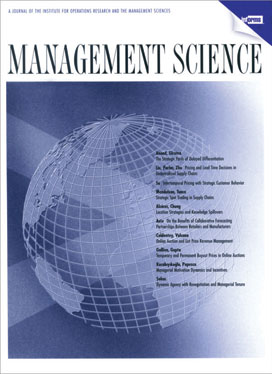Academic articles
Practitioner articles
Working papers
Books
Book chapters
Case studies
Other publications
Subject(s)
Technology, R&D management
Keyword(s)
Big data, knowledge creation, insight, information, IT, competitive advantage
Journal Pages
19–25
Subject(s)
Economics, politics and business environment; Finance, accounting and corporate governance
Keyword(s)
Institutional Investors, Political Activism, Political Contributions, Political Connections, Citizens United
JEL Code(s)
G14, G30
The landmark decision by the U.S. Supreme Court on Citizens United v. Federal Election Commission asserts for the first time that corporations benefit from First Amendment protection regarding freedom of speech in the form of independent political expenditures, thus creating a new avenue for political activism. This paper studies how corporations adjusted their political activism in response to this ruling. The paper presents evidence consistent with the hypothesis that institutional investors, in particular public pension funds, have a preference for not using the new avenue for political activism, a preference not shared by other investors.
Pages
57
Subject(s)
Economics, politics and business environment
Keyword(s)
Greek debt crisis, government debt crisis, European debt crisis, Greek bailout, Economic Adjustment Programme
JEL Code(s)
H50, H62, H81, H87
This paper provides a descriptive analysis of where the Greek bailout money went since 2010 and finds that, contrary to widely held beliefs, less than €10 billion or a fraction of less than 5% of the overall programme went to the Greek fiscal budget. In contrast, the vast majority of the money went to existing creditors in the form of debt repayments and interest payments. The resulting risk transfer from the private to the public sector and the subsequent risk transfer within the public sector from international organizations such as the ECB and the IMF to European rescue mechanisms such as the ESM still constitute the most important challenge for the goal to achieve a sustainable fiscal situation in Greece.
Pages
24
ISSN (Print)
1866–4016
Subject(s)
Information technology and systems
Keyword(s)
Physical unclonable functions (PUFs), ring-oscillator, FPGA
Subject(s)
Management sciences, decision sciences and quantitative methods; Product and operations management
Keyword(s)
Cooperation, competition, supply risk, coalition stability, supplier alliances
We study the alliance formation strategy among suppliers in a framework with one downstream firm and n upstream suppliers. Each supplier faces an exogenous random shock that may result in an order default. Each of them also has access to a recourse fund that can mitigate this risk. The suppliers can share the fund resources within an alliance, but they need to equitably allocate the profits of the alliance among the partners. In this context, suppliers need to decide whether to join larger alliances that have better chances of order fulfillment or smaller ones that may grant them higher profit allocations. We first analytically characterize the exact coalition-proof Nash-stable coalition structures that would arise for symmetric complementary or substitutable suppliers. Our analysis reveals that it is the appeal of default risk mitigation, rather than competition reduction, that motivates cooperation. In general, a riskier and/or less fragmented supply base favors larger alliances, whereas substitutable suppliers and customer demands with lower pass-through rates result in smaller ones. We then characterize the stable coalition structures for an asymmetric supplier base. We establish that grand coalition is more stable when the supplier base is more homogeneous in terms of their risk levels, rather than divided among a few highly risky suppliers and other low-risk ones. Going one step further, our investigation of endogenous recourse fund levels for the suppliers demonstrates how financing costs affect suppliers’ investments in risk-reducing resources and, consequently, their coalition formation strategy. Last, we discuss model generalizations and show that, in general, our insights are quite robust.
© 2016 INFORMS
Volume
62
Journal Pages
1297–1315
ISSN (Online)
1526-5501
ISSN (Print)
0025–1909
Subject(s)
Human resources management/organizational behavior
Keyword(s)
Corporate social responsibility, organizational identification, employee-customer identification, customer orientation, job performance
CSR activities such as charitable giving, environmental programs and ethical practices can motivate frontline employees. One of the key variables is organizational identification. CSR communicates values, and, if these values are consistent with a person’s own value system, it results in higher identification with the company. Employees who notice that consumers are fond of the company’s CSR activities will identify even more with the company. If CSR ranks high in their own personal value system and the value system of the consumer as well, they find common ground for conversations beyond immediate business talk. CSR can be an icebreaker in conversations with customers. Once service employees find out that customers share their passion for social or environmental causes, it creates a bond that is highly motivating. They become more confident that they know what the customers want. They are more motivated to serve those customers when they see that both of them care about the same sorts of things.
Volume
8
Journal Pages
24–29
Subject(s)
Human resources management/organizational behavior; Management sciences, decision sciences and quantitative methods; Strategy and general management
Keyword(s)
Status, performance feedback theory, decision making, college
rankings, Chivas Regal effect, pricing, signaling
This paper examines the effect of status loss on organizations’ price-setting behavior. We predict, counter to current status theory and aligned with performance feedback theory, that a status decline prompts certain organizations to charge higher prices and that there are two kinds of organizations most prone to make such price increases: those with broad appeal across disconnected types of customers and those whose most strategically similar rivals have charged high prices previously. Using panel data from U.S. News & World Report’s annual rankings of private colleges and universities from 2005 to 2012, we model the effect of drops in rank that take a school below an aspiration level. We find that schools set tuition higher after a sharp decline in rank, particularly those that appeal widely to college applicants and whose rivals are relatively more expensive. This study presents a dynamic conception of status that differs from the prevailing view of status as a stable asset that yields concrete benefits. In contrast to past work that has assumed that organizations passively experience negative effects when their status falls, our results show that organizations actively respond to status loss. Status is a performance related goal for such producers, who may increase prices as they work to recover lost ground after a status decline.
With permission of Sage
Volume
61
Journal Pages
217–253
Subject(s)
Management sciences, decision sciences and quantitative methods; Marketing
Keyword(s)
Market research, customer satisfaction, satisfaction attributes
JEL Code(s)
M30, M310
Secondary Title
Jahrbuch Markt- und Sozialforschung Schweiz 2016
Pages
12–15
Subject(s)
Management sciences, decision sciences and quantitative methods
Keyword(s)
Equal division, weighted division values, non-negative player, addition invariance on bi-partitions, nullified solidarity
Volume
80
Journal Pages
649–667
Subject(s)
Information technology and systems; Technology, R&D management
Keyword(s)
Strategic perspective, strategy implications, strategic management, strategy, innovation, IS/IT systems
A comprehensively updated revision of a book regarded by many as one the leading and authoritative titles for practitioners, academics and students in the domain of information systems and technology (IS/IT) strategy. Presents a structured framework with tools, techniques and ways of thinking which provide a practical approach to building a digital strategy, expressed primarily in the language of business and management. Brings together the implications of the significant advances in IT and the most useful current thinking, research, and experiences concerning the business impact and strategic opportunities created by IS/IT. Peppard and Ward discuss the key questions that managers have to grapple with of where, when and how to invest in IS/IT, which is why a IS/IT (or digital) strategy is required.
Volume
4th ed.,
Pages
504
ISBN
978-0-470-03467-5


